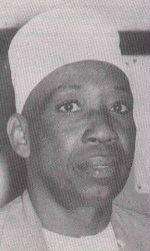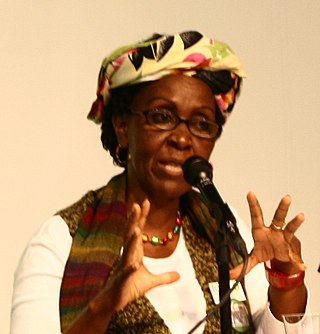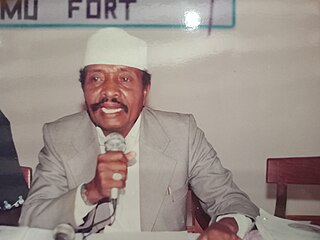Related Research Articles

Swahili, also known by its local name Kiswahili, is a Bantu language originally spoken by the Swahili people, who are found primarily in Tanzania, Kenya, and Mozambique. Estimates of the number of Swahili speakers, including both native and second-language speakers, vary widely. They generally range from 60 million to 150 million; with most of its native speakers residing in Tanzania.

As it is in other countries, the music in Tanzania is constantly undergoing changes, and varies by location, people, settings and occasion. The five music genres in Tanzania, as defined by BASATA are, ngoma, dansi, kwaya, and taarab, with bongo flava being added in 2001. Singeli has since the mid-2000s been an unofficial music of uswahilini for unplanned communities in Dar es Salaam, and is the newest mainstream genre since 2020.

Shaaban bin Robert, also known as Shaaban Robert, was a Tanzanian poet, author, and essayist who supported the preservation of Tanzanian verse traditions. Robert is celebrated as one of the greatest Tanzanian Swahili thinkers, intellectuals and writers in East Africa and has been called "poet laureate of Swahili" and is also known as the "Father of Swahili." He is also honoured as the national poet.

Following Tanganyika's independence (1961) and unification with Zanzibar (1964), leading to the formation of the state of Tanzania, President Julius Nyerere emphasised a need to construct a national identity for the citizens of the new country. To achieve this, Nyerere provided what has been regarded by some commentators as one of the most successful cases of ethnic repression and identity transformation in Africa.

Imani Sanga is Professor of Music in the Department of Creative Arts, formerly called Department of Fine and Performing Arts, in the College of Humanities at the University of Dar es Salaam, Tanzania. He teaches courses in Ethnomusicology, Philosophy of Music, Composition and Choral Music. And he conducts the university choir.
Jan Knappert was a well-known expert on the Swahili language. He was also an Esperantist, and he wrote an Esperanto-Swahili dictionary.
Swahili literature is literature written in the Swahili language, particularly by Swahili people of the East African coast and the neighboring islands. It may also refer to literature written by people who write in the Swahili language. It is an offshoot of the Bantu culture.
Muziki wa dansi, or simply dansi, is a Tanzanian music genre, derivative of Congolese soukous and Congolese rumba. It is sometimes called Swahili jazz because most dansi lyrics are in Swahili, and "jazz" is an umbrella term used in Central and Eastern Africa to refer to soukous, highlife, and other dance music and big band genres. Muziki wa dansi can also be referred to as Tanzanian rumba, as "african rumba" is another name for soukous.
Edwin Semzaba was a Tanzanian novelist, playwright, actor and director. He wrote his works mainly in Swahili. He taught in the Department of Fine and Performing Arts at the University of Dar es Salaam, Tanzania, where he taught, among other courses, creative writing and acting. He won the first award of East African Writers awarded by the Institute of Swahili Research for his novel Funke Bugebuge and the "grandchildren's adventure book writing competition" awarded by the Swedish Embassy in Tanzania (2007).
Kinjikitile "Bokero" Ngwale was a spiritual medium and a leader of the 1905–1907 Maji Maji Rebellion against colonial rule in German East Africa.
Abdilatif Abdalla is a Kenyan writer and political activist. He was imprisoned for his support of the Kenya People's Union, and began writing poetry in solitary confinement. A collection of poems from this time were published as a book titled Sauti ya Dhiki (1973), which was awarded the Jomo Kenyatta Prize for Literature.
Up to the second half of the 20th century, Tanzanian literature was primarily oral. Major oral literary forms include folktales, poems, riddles, proverbs, and songs. The majority of the oral literature in Tanzania that has been recorded is in Swahili, though each of the country's languages has its own oral tradition. The country's oral literature is currently declining because of social changes that make transmission of oral literature more difficult and because of the devaluation of oral literature that has accompanied Tanzania's development. Tanzania's written literary tradition has produced relatively few writers and works; Tanzania does not have a strong reading culture, and books are often expensive and hard to come by. Most Tanzanian literature is orally performed or written in Swahili, and a smaller number of works have been published in English. Major figures in Tanzanian modern literature include Shaaban Robert, Muhammed Said Abdulla, Aniceti Kitereza, Ebrahim Hussein, Abdulrazak Gurnah and Penina Muhando.
Gabriel Ruhumbika is a Tanzanian born novelist, short story writer, translator and academic. His first novel, Village in Uhuru, was published in 1969. He has written several subsequent novels in Swahili. He has also taught literature at a number of universities, and, until his retirement in 2016, he was a professor of Comparative Literature at the University of Georgia in the USA.

Elieshi Lema is a Tanzanian writer and publisher, also active in Tanzania's civil society.
Taasisi ya Taaluma za Kiswahili, known by its acronym TATAKI, is a research body dedicated to the research of the Kiswahili language and literature at the University of Dar es Salaam in Tanzania.
Farouk Mohamedhusein Tharia Topan is the director of the Swahili Centre at the Aga Khan University. He is a specialist in the language and literature of the Swahili people. He has taught at the University of Dar es Salaam, the Institute of Ismaili Studies, and the School of Oriental and African Studies.
May Lenna Balisidya Matteru was a Tanzanian author writing in the Swahili language.
Alikiona (Consequences) is a play written in 1969 by Tanzanian playwright Ebrahim Hussein. Alikiona, originally written in Kiswahili, was translated to English by Joshua Williams. The play tells the story of an affair between a woman, Sadia and her lover, Abdallah. It centers on the discovery of the affair by Sadia's husband, Omari. The play is in one act and is typically performed with five actors. Alikiona has many naturalist elements, as is characteristic of much of Hussain's earlier work. Further, the play also includes elements of kichekesho, a comic interlude often found in taarab performances.
Mashetani (Devils) is a play written in 1971 in Swahili by Tanzanian playwright Ebrahim Hussein. It has four acts and takes place in Tanzania shortly after the country's independence. The plot centers around the relationship of the characters Juma and Kitaru. Mashetani has some absurdist elements, including a play within the play and a dream sequence. In the stage directions, Hussein also added descriptions that give the play a more abstract, surreal expression. In Swahili, shetani (singular) is the word for an East African spirit. These spirits are mostly malevolent and appear as distorted figures. The play was translated to English by Joshua Williams (Oxford University Press: 2021.

Ahmed Sheikh Nabhany was a Kenyan academic scholar, poet, lexicologist, historian and professor often regarded as the father of modern Swahili poetry. He was the recipient of The Order of the Grand Warrior (O.G.W).
References
- 1 2 3 Ricard, Alain (1992). "Ebrahim's Predicament". Research in African Literatures. 23 (1): 175–178. JSTOR 3819960.
- 1 2 3 Alain Ricard (2011), "Hussein, Ebrahim", Dictionary of African Biography, Oxford University Press, doi:10.1093/acref/9780195382075.001.0001/acref-9780195382075-e-0865?rskey=o1zc1x&result=865, ISBN 978-0-19-538207-5 , retrieved 24 December 2024
- 1 2 3 4 Fiebach, Joachim (1997). "Ebrahim Hussein's Dramaturgy: A Swahili Multiculturalist's Journey in Drama and Theater". Research in African Literatures. 28 (4). Indiana University Press: 19–37. JSTOR 3820782.
- 1 2 Ricard, Alain (2000). Ebrahim Hussein: Swahili Theatre and Individualism. Dar es Salaam: Mkuki na Nyota. pp. 19–21. ISBN 9976-973-81-0.
- ↑ Ebrahim Hussein (1970), "Kinjeketile", New drama from Africa, vol. 5, Dar es Salaam: Oxford University Press, ISBN 9780196440866
- ↑ Fiebach 1997, pp. 33–34
- ↑ Joachim Fiebach, ed., Stücke Afrikas, Henschel Verlag, Berlin, 1974
- ↑ Fiebach 1997, p. 26
- ↑ Philipson, Robert (1989). Drama and National Culture: a Marxist Study of Ebrahim Hussein. Dissertation (Thesis) – via PhilPapers.
- ↑ Robert Philipson (1999), "Ebrahim Hussein: Theatre swahili et nationalisme tanzanien (review)", Research in African Literatures, vol. 30, no. 4, pp. 226–227, doi:10.1353/ral.2005.0048, ISSN 1527-2044
- ↑ "The Ebrahim Hussein Poetry Prize". The Citizen. 16 October 2018. Archived from the original on 17 October 2018. Retrieved 25 February 2019.
- ↑ Diwani ya tuzo ya ushairi ya Ebrahim Hussein. Juzuu la pili. Juzuu la pili. Dar es Salaam: Mkuki na Nyota Publishers. 2017. ISBN 978-9987-08-326-8. OCLC 1057556367.
- ↑ "Ebrahim Hussein Fellowship". University of Wisconsin, African Cultural Studies Dept. Archived from the original on 3 April 2020. Retrieved 11 September 2020.
- ↑ "Two Students Awarded Ebrahim Hussein Fellowships" (Press release). University of Wisconsin, African Cultural Studies Dept. 17 April 2020. Retrieved 29 November 2021.